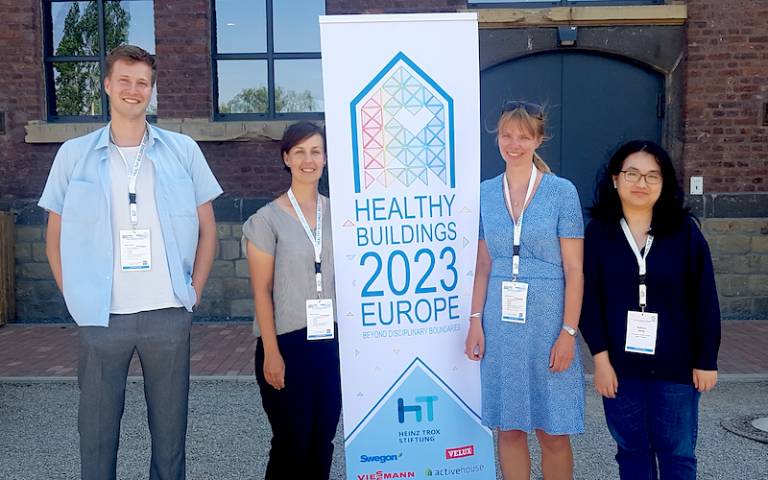UCL staff and students present at 'Healthy Buildings Europe 2023' in Aachen, Germany
15 June 2023
Four researchers and students from the UCL Institute for Environmental Design and Engineering gave talks and poster presentations at the conference, with one student winning an award for their poster presentation

The UCL Institute for Environmental Design and Engineering was well-represented this June at the 'Healthy Buildings Europe 2023' in Aachen, Germany. The conference, which was attended by approximately 400 academics and experts, is in its eighteenth year and is regarded as one of the most influential conferences on healthy and sustainable built environments.
The breadth and depth of work presented by the staff and students from IEDE was well-suited to this year’s conference theme, “Beyond disciplinary boundaries – Transdisciplinary perspectives on multisensory stimulation for innovative and creative solutions in a post-Covid era.”
Dr Gesche Huebner and PhD students Ruiwen Deng and Simon Vakeva-Baird presented posters and Dr Elizabeth Cooper gave a long oral presentation. Simon Vakeva-Baird, supervised by Prof. Dejan Mumovic, presented a poster entitled, "Combining consultation surveys with qualitative discussion and quantitative multicriteria decision-making workshops to engage stakeholders within the design process for healthy net-zero whole life carbon buildings", which was awarded 'Best Poster' of the conference. Simon’s research comprises multiple stages of surveys and workshops, applied to case studies with net-zero, social and environmental excellency aspirations in different climatic zones. It aims to provide design teams with rich technical and non-technical stakeholder engagement data and achieve collaborative levels of participation, with mechanisms of evaluation embedded into the engagement processes to ensure refinement opportunities.
Ruiwen Deng, supervised by Dr Marcella Ucci, presented "Associations Between Residential Indoor Temperatures and Self-Reported Sleep Problems in UK adults: a cross-sectional study", and received strong feedback from experts in the field. Ruiwen’s work examines the effect of the thermal environment on human sleep, which may be mediated by adaptive behaviours and/or design features of the built environment. In this research, a cross sectional analysis of the 1989 NSHD (National Survey of Health and Development) cohort was conducted, to evaluate associations among outdoor temperature, indoor temperature, and self-reported sleep quality outcomes.
Dr Huebner's poster, "How the built environment is linked to mental health and wellbeing – results of a cross-sectional analysis using secondary data", was co-authored with Dr Ian Hamilton and Dr Tadj Oreszczyn of the Energy Institute. This work presented research on relationships between the built environment, in particular residential homes and their surroundings, and mental health and wellbeing. Their analysis showed that wellbeing was most strongly related to personal variables, but that both housing and neighbourhood variables, such as being able to keep the house warm and experiencing dampness, also play a significant role.
Dr Cooper gave a talk on, "Advancing a health-model linked smart control framework to improve occupant health and comfort in residences", work done with Dr Yan Wang, Dr Sam Stamp and Prof. Mumovic. The work built upon previous research that proposed a smart control framework that combined portable air purifiers and automatic window control systems to reduce indoor PM2.5 concentrations in residences whilst maintaining thermal comfort. The results showed that dual control of portable home air purifiers and window openings has the potential to maintain thermal comfort as well as achieve effective PM2.5 removal even in cases of high indoor sources that could lead to considerable health benefits with relatively low energy cost.
Links
- Learn more about the Healthy Buildings Europe conference.
- Learn more about the work of Elizabeth Cooper.
- Learn more about the work of Gesche Huebner.
- Learn more about the work of Riuwen Deng.
- Learn more about the work of Simon Vakeva-Baird.
Image credit: Elizabeth Cooper
 Close
Close

